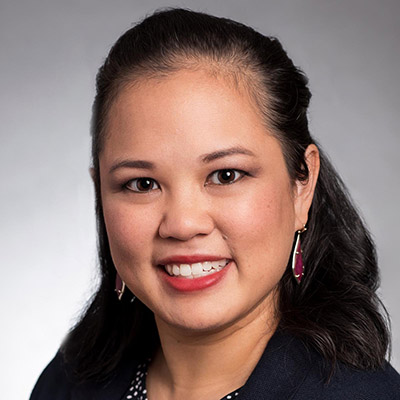Presenter Profile

Melissa H. Kwan, MD, FAAP
Director of Community Pediatric Hospital Medicine, McGovern Medical School
Director of Inpatient Pediatrics, Memorial Hermann Sugar Land
Chief of Staff, Memorial Hermann Sugar Land
UTHealth Houston | McGovern Medical School
Department of Pediatrics | Community Hospital Medicine
melissa.h.kwan@uth.tmc.edu
Melissa Kwan, MD FAAP is an Assistant Professor with the UT Health Houston McGovern Medical School, Director of Community Pediatric Hospital Medicine for the UT Houston and Memorial Hermann Community Hospitals, and the Chief of Staff for Memorial Hermann Sugar Land. She is also one of the Co-Chairs for the Texas Pediatric Society Injury Prevention Committee and is the co-PI for her IFCK chapter. She has an focus in child passenger safety, infant sleep safety, firearm prevention, and water safety. She also spends her summers at Texas Lions Camp in Kerrville, Texas where she is medical staff for their camp for children with Type 1 Diabetes. She lives in Sugar Land, TX with her cello loving four-year-old and amazing architect husband, Danny Rigg.
Presentations
Back to School Programming in a Large Metropolitan Area
Melissa H. Kwan, MD, FAAP
Sarah Beth Abbott, BS, EMT-LP
Victoria Pennington, LMSW, CCLS, CPST
Rodrigo Ordonez Palacios
Sandra McKay, MD FAAP
Back to school time is a great time to engage with families as this is a time for establishing new routines. Families are considering how they are going to be transporting kids to school, and it is a chance to emphasize ways to minimize the risks. We partnered with a local school district that serves over 44,000 students in a suburb of a large metropolitan area with a back-to-school celebration that has approximately 4000 attendees from the surrounding area to bring transportation education, bike helmets, injury prevention, first aid, and CPR education to our community.
Planning started 6 months prior to the event by determining the priorities and scope for this event. Through a partnership with our local community hospital’s marketing team and our IFCK chapter, we were able to purchase bicycle helmets through the state medical association community outreach program which provides a discounted and matching program for helmets that are purchased through them. We were also able to obtain safety lights, stickers, and hand-outs on how to fit a bicycle helmet and their importance. Volunteers from our community hospital and medical school fit these helmets properly.
We provided information about vehicle safety and child passenger safety with an emphasis on child safety seats for the elementary aged child. Paper collateral was provided by our state transportation department. We used a large stuffed animal giraffe that measures just under 4’9” so participants to measure themselves and gauge if they were tall enough to be out of a booster seat. Additional information was provided regarding teen driving and pedestrian safety.
We also had information for families regarding water safety and provided participants with Water Watcher cards and other water safety information. We also sponsored a booth where attendees had a chance to learn hands only CPR and how to use EpiPens. Pocket first-aid kits were distributed.
To bring participants to our tables, we had a volunteer dressed as the hospital mascot. Their presence allowed families to feel comfortable approaching the booth and provided a memorable photo opportunity for attendees to take with them.
With 25 volunteers: ~ 450 bicycle helmets fitted and distributed ~ 200 Water Watcher cards ~ 150 participants learned hands only CPR and use an EpiPen. Even more participants learned about child passenger safety for older children and pedestrian safety.
Leveraging established events can be an effective way to provide safety information to our community. Opportunities for improvement include moving the CPR station indoors to increase participation. This event was in August with temperatures in the upper 90s which is a major deterrent. Most of the traffic was families with elementary/early middle school aged children. If we plan to do more older adolescent education, we need to make it clearer or locate to an area of the event targeted to teens.
1. Describe how to develop and fund a successful educational program within a larger community event.
2. Examine funding sources and partnerships to help make an event successful.
3. Identify how a program like this can be replicated and evaluated in other arenas.
